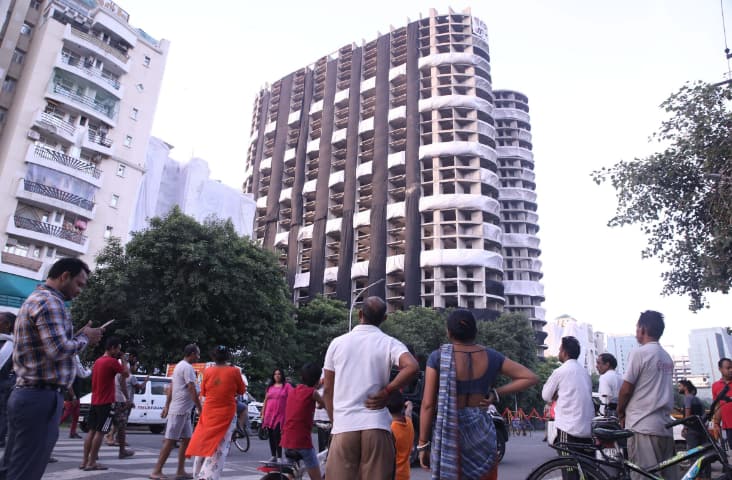Noida Twin Towers demolition: Rise and fall of Supertech's controversial project
Noida Supertech Twin Towers demolition: Take a look at the timeline of the ambitious project from its inception to its destruction.
- Noida's twin towers are all set to be demolished today
- The towers, taller than Qutub Minar in the national capital, include Apex (32 storeys) and Ceyane (29 storeys)
- They were found to be in violation of multiple regulations regarding construction
New Delhi: With Noida's twin towers all set to be demolished today, it`s time to take a look at the story from their rise to imminent fall, ahead of the implosion scheduled at 2.30 pm. The towers, taller than Qutub Minar in the national capital, include Apex (32 storeys) and Ceyane (29 storeys), which are part of the Emerald Court, were found to be in violation of multiple regulations regarding construction following which a long legal battle was fought in the Allahabad High Court and then the Supreme Court of India which culminated in favour of the Residents Welfare Association.
Supertech Noida Twin Towers: How the story began
The Inception: The story began after a plot was allotted to Supertech Ltd in 2004 by the New Okhla Industrial Development Authority (NOIDA) for the development of a housing society which came to be known as Emerald Court. In 2005, the building plan for the construction of 14 towers with 10 floors each for a housing society was approved by the Authority according to the New Okhla Industrial Development Area Building Regulations and Directions 1986.
Supertech was given permission to construct 14 towers with 10 storeys each. However, the restriction on the maximum height was imposed to be 37 metres. As per the original plan, 14 towers with 10 storeys each and a shopping complex along with a garden area constituted the project. In June 2006, the company received additional land for the construction with the terms being the same. The plan was revised.

According to the new plan, two more towers had to come up, in which the garden was scrapped. In 2009, the final plan was the construction of two towers Apex and Ceyane with 40 floors each while the plan was yet to be approved.
RWA filed a petition against the Twin Towers in 2011
The Destruction: In 2011, the Residents Welfare Association filed a petition in the Allahabad High Court. It was alleged that the UP Apartment Owners Act, 2010 was breached during the construction of the towers.
The homeowners claimed that the two towers had less than 16 metres of distance between them which was in violation of the law. The original space designated for the garden in the original plan was allegedly used to erect the twin towers. In 2012, the Authority approved the new plan proposed in 2009, ahead of the commencement of hearing in the Allahabad High Court.
Allahabad HC ordered builders to demolish towers at own expense in 2014
In April 2014, the Allahabad High Court delivered the judgment in favour of the RWA while also passing an order to demolish the twin towers.
It asked Supertech to demolish the towers at its own expense and also refund the money of the homebuyers along with 14 per cent interest. In May 2014, the Noida Authority and Supertech moved the Supreme Court stating that the construction of the twin towers were according to the regulations.
Supreme Court upheld Allahabad High Court's order in 2021
In August 2021, however, the Supreme Court affirmed the order of the Allahabad High Court and ordered to demolish the towers while also stating that the construction had been made in violation of the regulations.The Supreme Court has said that the date of demolition may be confirmed as August 28, with a "bandwidth of seven days" between August 29 to September 4, to take into account any marginal delay on account of technical reasons or weather conditions.
The twin towers will finally be demolished today. However, the health impact of the resulting dust on residents will be minimal as experts overseeing the demolition will take steps to control the impact. Dr Mrinal Sircar, Head Pulmonology and Critical Care, Fortis Noida said, "When you demolish a big structure like that, there will be dust and there would be some smoke because you are using explosives. So, the direction of the air matters.
The direction of the wind should also be taken into consideration. Demolishing like this or rather an explosion happening in the open air is much safer than say underground mines.""The dust and gases will get diluted in the air and will get dispersed. The experts who are involved in such big demolitions will take care of all these things," Dr Sircar added.
Stay informed on all the latest news, real-time breaking news updates, and follow all the important headlines in india news and world News on Zee News.
)
